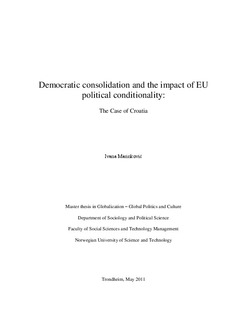Democratic consolidation and the impact of EU political conditionality: The Case of Croatia
Master thesis
Permanent lenke
http://hdl.handle.net/11250/268441Utgivelsesdato
2011Metadata
Vis full innførselSamlinger
Sammendrag
This thesis aims at assessing democratic consolidation in Croatia within the context of the EU accession negotiations in the past decade. It looks specifically at whether and to what extent the EU enlargement policies and political conditionality approach have been an effective tool in promoting democratic change and consolidation in Croatia, particularly in the following areas: cooperation with the ICTY, the fight against corruption, the consolidation of an independent judiciary, and fundamental rights, with special attention to freedom of expression. Thus, Croatia is referred to as an empirical case, but discussion can have wider appliance to other EU non-member states in Southeastern Europe and identify some of the advantages and shortcomings of the EU approach. Moreover, the country‟s specific features, such as the war of independence as well as Tudjman‟s personality and style of governance, have delayed taking up most of the democratic reforms and thus, have slowed down democratic change and consolidation for entire decade. In addition, the governments‟ hesitation to introduce necessary democratic reforms, due to domestic pressures of various interest groups has for a long time presented an important obstacle to any substantial changes and consolidation, as well as to Croatia‟s EU membership. Nevertheless, Croatia nowadays has achieved a stable and consolidated democracy, to which EU enlargement policies and its political conditionality have contributed significantly. Although there are still many problems to address, especially in terms of fight against corruption and war crimes issues, there is no direct threat from democratic breakdown or the erosion of democracy in the country.
